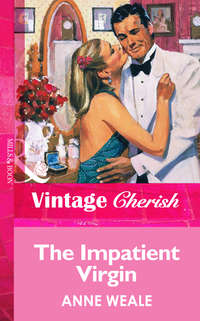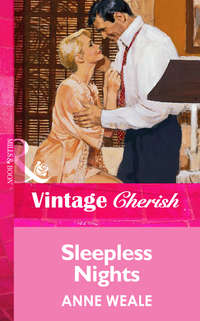
Полная версия
Worthy Of Marriage
Swallowing her resentment of his unforgiving attitude, she said, ‘I’m very grateful to your mother for extending a helping hand to me. I shan’t abuse her trust.’
‘See that you don’t.’ He walked out.
He and Mrs Calderwood were in the drawing room, chatting as if nothing untoward had happened, when Lucia joined them. From the clothes put out for her to wear, she had chosen a plain white shirt and a pair of pale khaki chinos.
As she entered, Grey rose. It was, she knew, an automatic reflex ingrained from boyhood. Actually he felt none of the chivalrous respect implied by the now-rare courtesy of standing up for her.
‘What would you like to drink, Lucia?’ Mrs Calderwood asked. ‘Grey is having a gin and tonic and my pre-lunch tipple is always Campari and soda—unless I’m alone. I never drink on my own.’
‘May I have a soft drink, please?’ After months of abstinence, Lucia didn’t want to risk her first taste of alcohol going to her head.
‘Of course. Orange juice or peach juice?’
‘Orange juice, please.’
Grey moved to an antique cupboard, the upper half containing glasses and bottles, the lower concealing a small fridge. He brought her a crystal goblet with ice cubes floating in the fruit juice. Rather than handing it to her, he placed it on the end table of the sofa which his mother had indicated her guest should share with her.
‘Thank you.’ Lucia wondered if he felt that physical contact with her, even of the most fleeting kind, might contaminate him. He had probably never had to socialise with an ex-prisoner before.
She had always known there would be people who would consider her unfit to mix in polite society. That was inevitable. She just hadn’t expected to encounter that attitude on her first day outside.
‘What were the meals like in prison?’ Rosemary Calderwood asked. ‘Like boarding school food, I imagine…lots of stodge and over-cooked vegetables.’
Lucia nodded. ‘Chips with everything and not enough salad. But then prison isn’t supposed to be like a pleasure cruise.’
‘No, but they should feed people properly. You look as if you’re several pounds under your proper weight. We’ll soon put that right. Both Braddy and I are excellent cooks and we have a big kitchen garden so our vegetables haven’t been grown under plastic and spent days being transported to a supermarket. I’m a bit of a health freak. My children tease me about it, but I do most strongly believe we are what we eat.’
Obviously aware of the antagonism between her son and her protégée, Rosemary kept a conversation going with the skill of an accomplished hostess. From time to time she forced her son to take part with a question or comment that he was obliged to respond to. Lucia was glad to pick up the cues she gave her. If it hadn’t been for Grey’s presence, she would have been in heaven.
The elegant room, with its paintings, antiques, oriental rugs and bowls of freshly-cut flowers from the garden outside was balm to her beauty-starved senses.
Presently they moved to the dining room where three places had been laid at the end of a long polished table.
Grey drew out the chair at the end for his mother. Lucia seated herself. Then Mrs Bradley came in with the first course, a dish of grilled aubergines garnished with chopped herbs and crumbled feta cheese.
‘Will you have some wine?’ Grey asked, after pouring a pale golden liquid into his mother’s glass.
Lucia decided one glass would be OK. ‘Yes, please.’
He moved round the table, standing close to her chair, making her strangely conscious of his nearness, his masculinity. Was it only because she was used to an almost exclusively female environment? The prison doctor and the chaplain were the only men she had seen during her time inside.
Compared with the fare provided since her arrest, the aubergines were almost unbearably delicious. Then came the cutlets, decorated with strips of red pepper and served with a bulghur wheat salad containing diced cucumber, chopped spring onions, toasted pine nuts and fresh mint. The tapenade mentioned earlier turned out to be the black olive paste smeared on the cutlets.
While they were eating, Grey suddenly asked her, ‘Are you wearing a PID?’
Before Lucia, startled by this abrupt return to hostilities, could answer him, his mother said, ‘What is a PID?’
‘Ms Graham will explain,’ said Grey, eyeing her with undisguised dislike.
‘PID stands for Personal Identification Device,’ Lucia said evenly. ‘It’s about the size of a diver’s watch, but it can be attached to the ankle as well as the wrist. It sends a signal to a radio receiver called a Home Monitoring Unit. If the monitor can’t detect the signal, it sends a message to the Monitoring Centre where records are kept of offenders and their curfew orders. It’s a way of keeping a check on people who, like me, have been released early.’
She had been speaking to Mrs Calderwood, but now looked directly at her son. ‘But I’m not wearing one, Mr Calderwood. They must have thought it wasn’t necessary. I haven’t been given any curfew instructions.’
‘Possibly not, but I think you will find that you’re not completely at liberty,’ he said sternly. ‘It’s unlikely the conditions of your release will permit you to leave the country. If you can’t go abroad, you’re of little use to my mother.’
This was an aspect of the situation that Lucia hadn’t considered. She had a sinking feeling he might be right.
‘That point was raised by Miss Harris when we discussed Lucia’s case,’ said Mrs Calderwood. ‘Luckily I have a friend at court, as they say. Or, rather more usefully in this instance, at the Home Office. He kindly pulled some strings for me. In view of the fact that I was a magistrate for twenty years, it was decided I was a suitable person to supervise Lucia’s life until she is free to go where she pleases. As long as she is with me, there are no restrictions on her movements.’
This announcement made Grey look even more forbidding. Clearly, he had thought he was playing a trump card and was furious to find himself trumped.
Lucia wondered if he also had friends in high places whose influence he could bring to bear. He struck her as a man who, once he had put his mind to something, would not easily be defeated. There was obstinacy, even ruthlessness, in the jut of his jaw.
The meal ended with a rhubarb compote served with whipped cream.
Forgetting for a moment the constraint imposed by the man on the other side of the table, Lucia said to her hostess, ‘I shall remember this lunch all my life. It was a lovely meal by any standards, but for me…’ She made an expressive gesture.
‘Good: I’m glad you enjoyed it. As it’s such a warm day, let’s have coffee on the terrace, shall we? Then I’ll take you round the garden. Since all the children left home, gardening has been my principal occupation,’ Rosemary told her. ‘But now I’m beginning to find that I can’t kneel and bend as comfortably as I used to. So I’m turning more and more to painting. The wheel is turning full circle.’
‘After coffee I must be off. I shouldn’t really have skived off,’ said Grey.
Just as Lucia was thinking that the slang expression for evading one’s responsibilities or duties sounded odd coming from him, he glanced at her and she knew he was thinking, But it’s fortunate that I did or I wouldn’t have known about you.
‘You work too hard,’ said his mother. ‘Don’t become like your father…a workaholic. There is more to life than doing business.’
Lucia wasn’t sure what Grey did for his living. It must be something highly profitable if he could afford to spend six-figure sums of money on paintings. At the time of the trial, the tabloids had described him as a ‘tycoon and art connoisseur’ always giving his age, thirty-six, after his name.
As almost the only people who had made vast fortunes at his age were the Internet billionaires, and somehow he didn’t look like Britain’s answer to Bill Gates, it seemed likely he had inherited the fruits of his father’s workaholicism.
The opulence of his parents’ house, and the fact that his mother had spent her life being a homemaker, indicated that Calderwood Senior had been a man of substantial means.
Grey made no comment on his mother’s admonition. Perhaps it was one he had heard many times before and didn’t take seriously. He gave the impression of being a man who would always do what he thought best, regardless of advice.
He was one of those people—Lucia had met a few others—who came over as being propelled by a strong driving force. But what form his took and where it was driving him, she didn’t yet know. Most likely it was money or power, or both. Those seemed to be the two most common motivations among the male sex. She preferred creative people…artists, musicians, poets. Grey probably looked at paintings as investments rather than food for the spirit.
The stone-flagged terrace on the south side of the house was furnished with comfortable cane chairs and loungers. As she sipped her coffee, Lucia would have liked to lie back and snooze.
It had been a taxing day: being released, then being whisked away on a magical mystery tour, then crossing swords with Grey had made it stressful as well as memorable. She had hardly slept last night. Now she was finding it hard to keep her eyes open…
Driving back to London, Grey blamed himself for not foreseeing and averting his mother’s ill-conceived plan to help the Graham girl find her feet.
His part in bringing the fraudsters to justice had worried her. He loved his mother and his sisters, but they were all the same; sentimental liberal do-gooders who could find excuses for everything except cruelty to animals and children and crimes against humanity. And even in those cases they were inclined to look for reasons why the perpetrators had done what they’d done.
Grey didn’t belong to the pity-the-victims-of-society brigade. He didn’t regard himself a hard man, but he was a realist. At the time of the trial he had felt no regret for being instrumental in exposing a scam, helping to stop it and seeing the culprits suitably punished.
Now, having met Lucia, he was a good deal less comfortable with the thought of what she had been through.
He remembered how she had looked in the bath and how, to increase his annoyance, he had found himself aroused by the sight of her breasts. At first, as she lay submerged, they had floated like two pale islands with rose-coloured crests. Then, as she sat up in a hurry, they had changed shape and, for a fleeting moment before she concealed them with her forearms and the sponge, formed two exquisite half-spheres that had instantly triggered a strong reaction in his groin.
Perversely, the fact that her body excited him had made him snarl at her even more fiercely than he had intended. Had her alluring looks made her the target for advances from the tough, amoral, sexually frustrated women who were bound to be found among any prison’s inmates and possibly among those who ran such places?
The fact that Lucia was what his mother’s peer group called ‘a lady’ would have made her even more of a target for the kind of prisoner or warder who resented people whose lives had been more privileged than theirs.
He had an unpleasant vision of Lucia being locked up in a cell with hardened and unscrupulous criminals from whom she would have no escape. The picture revolted and enraged him to the extent that, several minutes later, he realised he had unconsciously increased his pressure on the throttle to the extent that the car was streaking down the overtaking lane at well beyond the motorway limit.
Reducing speed, he switched his mind to matters that had nothing to do with the girl who, when last seen, had fallen into a deep sleep.
‘She’s exhausted, poor child. Let’s leave her and go for a stroll,’ his mother had whispered.
Later, saying goodbye to him, she had said, ‘You aren’t cross with me for putting you down before lunch, are you? Your father would have been furious, but I don’t think your ego is quite as large or as sensitive as his was, thank goodness. Although I loved him, I didn’t always like him, you know. We were never the friends and equals that married people should be…that I hope you and your wife, when you find her, will be.’
The truth, though he hadn’t admitted it, was that he had been angry when, in front of the two other women, she had told him off for being dictatorial. But he could never be angry with her for long. Many times, when he was feeling his oats and before he had learnt how to handle his domineering father, she had averted clashes between them. He knew she had paid a high price for loving a man who, though he claimed to worship her, had expected her to conform to his idea of the perfect wife and never allowed her the freedom to adapt that role to her own needs.
Grey knew she was longing for him to emulate his sisters by marrying and starting a family. He didn’t think that was going to happen. He had enjoyed a number of relationships with women, but he had never met one who tempted him to give up his freedom. He didn’t think he ever would.
When Lucia woke up she found herself alone with Rosemary who was working on a piece of needlepoint.
‘I’m sorry. How long have I been asleep?’
‘Just over an hour. No need to apologise. You needed it. Grey has gone back to London. He lives by the river which is as nice as living in a big city can ever be. I can stand it for forty-eight hours, but after that claustrophobia sets in. I need to get back to the country. I’ll tell Braddy you’re awake. We’ll have some tea and then I’ll take you on a tour.’
At seven they had a light lap supper while watching the news on TV. Then there was a gardening programme Rosemary wanted to watch, followed by a repeat of a popular comedy show.
When that was over, she said, ‘If I were you I should have an early night, or at least read in bed. You’ll find a selection of books that I thought might interest you on your bedside table.’
As they both rose, Lucia said, ‘I don’t know how to thank you for being willing to give me this chance. I’ll do my best to make sure you never regret it.’
‘I’m quite sure I shan’t,’ Rosemary said kindly. ‘Goodnight, Lucia. I hope you sleep well. Tomorrow we’ll plan our first expedition together.’
To Lucia’s astonishment, Grey’s mother placed her hands on her shoulders and kissed her lightly on both cheeks.
During her time in prison she had found she could bear the bullying of some of the screws, as the prisoners called the prison officers, and the hostile behaviour of some of her fellow inmates. It was always the unexpected kindnesses that had weakened her self-control.
Now the affectionate gesture brought a lump to her throat and made her eyes fill with tears. But it wasn’t until she was alone in her room that she flung herself into an armchair and indulged in the luxury of weeping.
Later, after washing her face, brushing her hair and teeth, and putting on the hand-smocked white voile nightgown spread across the turned-down bed, she opened the curtains and turned out the lights.
Tonight she didn’t feel like reading. She just wanted to lie in the comfortable bed and watch the moon through an unbarred window and try to accustom herself to this miraculous change in her fortunes.
Whether she could ever win Grey’s good opinion seemed doubtful. In his view, and that of many other people, she would probably carry the stigma of her crime for the rest of her life. It was a lowering prospect: never, in some people’s estimation, to be re-admitted to the ranks of the honest and honourable.
Then, as her lips began to quiver and she felt another bout of crying coming on, she told herself not to be a wimp. What did it matter if Grey continued to despise her? Rich and arrogant, what did he know about ordinary people’s lives and the pressures they had to bear?
Clearly he wasn’t accustomed to anyone defying him. Most likely he would blame Lucia for his mother’s refusal to accept his embargo on her plan. It was also likely he would look for ways to enforce his will.
If he did, she would resist him, as she had this morning when he had tried to buy her off. From what she had seen of ‘Mr Grey’ as the housekeeper called him, Lucia felt it might do him a great deal of good to have someone around who would refuse to kowtow to him.
CHAPTER THREE
LUCIA was woken by birdsong.
She lay listening to what she realised must be the dawn chorus as heard in the depths of the country. Compared with the twitterings at first light of suburban and city birds, it was like someone whose only experience of choral music had been a small school choir hearing, for the first time, the chorus of a grand opera company. After a while it died down and she drifted back to sleep until something else woke her. This time the room was full of sunlight and Mrs Bradley was bringing in a breakfast tray.
‘Mrs Calderwood thinks you should take it easy for a few days,’ said the housekeeper, after they had exchanged good mornings. ‘She’ll be up to see you presently. You can eat eggs, I hope?’
‘I can eat anything,’ Lucia assured her.
After the housekeeper had gone, she nipped out of bed to brush her teeth before drinking some of the chilled orange juice. Under the silver-plated dome with a handle on the top was a perfectly poached egg, with the deep orange yolk only produced by hens who could peck where they pleased, on a thick slice of toasted brown bread. Several more slices of toast were swathed in a thick napkin inside a basket, next to a little dish filled with curls of butter and a glass pot of thick-cut marmalade that, like the bread, looked home-made.
After months of enduring the horrible breakfasts in prison, Lucia relished every mouthful. She was pouring the last of the tea into her cup when there was a tap on the door and Rosemary appeared.
‘Good morning. What sort of night did you have?’
‘Wonderful, thank you.’
‘Good. I’m told that coming out of prison is like being discharged from hospital after a major operation. It’s best to take things rather slowly…re-adapt at a leisurely pace. I thought this morning we’d take the dogs for a walk. They belong to my eldest daughter Julia and her husband. They’re visiting a game reserve in Africa. Leaving the dogs with me is preferable to boarding them in kennels.’
Later, while they were walking an elderly golden retriever and two energetic Jack Russells, she said, ‘Perhaps you’ve wondered why I didn’t visit you in prison to introduce myself before you came here?’
‘I hadn’t thought about it,’ said Lucia.
‘I felt it might be an intrusion on the short time you were allowed to see people you knew,’ Rosemary explained. ‘Also I felt it would be difficult to make friends in those circumstances.’
‘It would have been,’ Lucia agreed.
She did not reveal that she had had no visitors. Some of the people who might have come to see her lived too far away. After giving up her last job to take care of her father during his long illness, she had lost touch with former colleagues. In their twenties, most people had too much going on in their own lives to bother with colleagues who had either been ‘let go’ or had dropped out for other reasons. Anyway, from what she had seen, visits from family members and friends could be more upsetting than pleasurable.
But she didn’t want to think about what she had learned in prison. She wanted to put it behind her and get to grips with the future.
‘These painting trips you mentioned yesterday…where are you thinking of going?’ she asked.
‘I thought we might start with the Channel Islands before going further afield. Years ago, when the girls were small, we shared a house on Sark with some friends who also had young children. We took it for a month. Our husbands came over to join us at the weekends. Other years we went to France. Do you speak French, Lucia?’
‘Not very much, I’m afraid.’
‘Never mind. It’s not important. I’m not a linguist myself, nor was my husband. I don’t know where Grey gets his gift of tongues from.’
‘Does he need them for his work?’
‘Not specifically, but languages are always an asset. He does travel a lot, both for business and pleasure.’
In his spacious office on the top floor of a riverside tower block in London, Grey was pacing the thick carpet and thinking about the girl who, forty-eight hours ago, had still been locked up, and today was being cosseted by his mother, an expert at pampering anyone whom she considered needed it.
There were other things that he ought to be giving his mind and, normally, he kept his life neatly compartmentalised, focussing his whole attention on the compartment he was in. Right now that was the property business started by his grandfather, developed and expanded by his father, and now directed by himself.
But instead of being able to concentrate on matters pertaining to a major expansion, he was fidgeted by a strong hunch that, unless he found a way to get rid of her, that girl was going to cause trouble.
After pressing the bell for his personal assistant, he took another turn around the room.
When, notepad in hand, she appeared in the doorway, he said, ‘Bring me the file on that court case I was involved in, would you, Alice? And I want to speak to my sister Jenny, if you can get her.’
Alice nodded and withdrew. A few moments later she reappeared with a black ring-binder and placed it on his desk.
He was leafing through the collection of press clippings, each one in a plastic pocket labelled with the date and source, when one of his telephones rang. He picked it up. ‘Yes?’
‘I have Mrs Wentworth on the line, Mr Calderwood.’
‘Put her on, please. Hello, Jenny. How are you?’ He listened to her reply, then said, ‘Are you free this weekend? Splendid. Then call Mum and invite yourself to lunch on Sunday, will you? I’d like your opinion on her latest lame duck.’
The news that Rosemary’s youngest daughter was coming to lunch made Lucia a little nervous, but she knew that meeting people was something she must get used to.
It was when Mrs Calderwood added, ‘And Grey is coming too,’ that her nervousness moved up a gear, though she hoped her face didn’t show it.
‘Does he visit you often?’ she asked.
‘As often as he can…but he’s very busy,’ his mother replied. ‘Jenny’s husband, Tom, is more laid-back than Grey. He’s an architect in a partnership. That isn’t always plain sailing, but it’s nothing like as onerous as the burden on Grey. In these tough, competitive times, having to make decisions that affect a very large work-force is a massive responsibility. It’s what brought on my husband’s health problems. But Grey keeps himself fit. Robert used to play golf, but I don’t think that was as good for him as the swimming and fencing and work-outs that Grey goes in for.’
‘What is his business?’ Lucia asked.
‘His grandfather was a builder. He never made very much money from the business but he put what money he had into buying land on the outskirts of towns. You may not have heard of a Hollywood film star and comedian called Bob Hope, but he was very famous in his day. He was my father-in-law’s favourite star, and somewhere he had read that Bob Hope put most of his earnings from movies into buying up land on the outskirts of American towns. So my father-in-law did the same thing. He didn’t benefit from it but Robert, my husband, did. It enabled him to expand the business in all sorts of directions. By the time Grey left university, it was one of the largest private companies in the country.’
Lucia had already learned that the Calderwoods had almost despaired of having a son. As well as having three daughters, Rosemary had had two miscarriages. Then, aged thirty-four, she had conceived again. She had had to spend most of her sixth pregnancy in bed but, at the end of it, had produced the longed-for male child.
With doting parents and three older sisters, Grey must have been spoiled rotten from birth, was Lucia’s conclusion.







